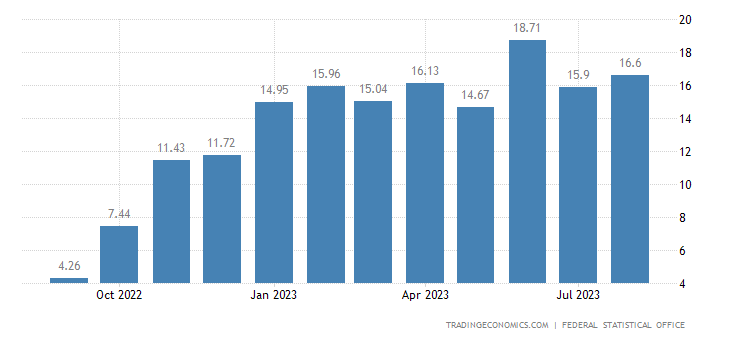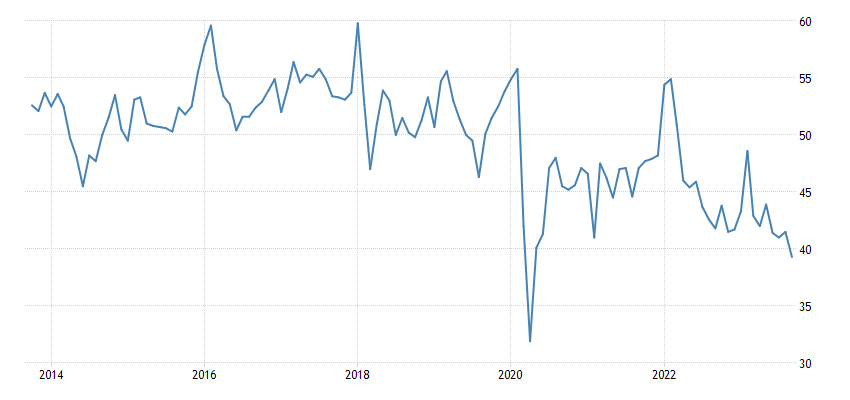Germany: the positive trade surplus hides a big problem

If we superficially analyze the German trade balance it would seem that things have almost returned to Berlin and that everything is fine. In reality, a more careful analysis of the data, combined with other values, reveals that, in reality, there is something rotten in Berlin and in the German economy.
The trade surplus in Germany increased to 16.6 billion euros in August 2023 from 15.9 billion euros in the previous month, exceeding market expectations of 15 billion euros.
But be careful, exports fell by 1.2% to 127.9 billion euros, the lowest value since March 2022, and much worse than forecasts of a 0.4% decline.
Meanwhile, imports unexpectedly fell 0.4% to 111.4 billion euros, the lowest level since January last year, missing expectations for a 0.5% increase.
Exports to EU countries decreased by 1.5%, of which those to the Euro Area decreased by 2.6%; while purchases grew by 1.9%, with those from the Euro Area increasing by 3.2%. Exports to countries outside the EU decreased by 0.9%, mainly sales to the United States (-1.3%), United Kingdom (-4.2%) and Russia (-0.5% ), but sales to China increased by 1.2%., in spite of the "Decoupling" that Von Der Leyen talks about.
Imports from third countries decreased by 3%, in particular from the United States (-3.1%), the United Kingdom (-0.9%) and Russia (-23.4%). Compared to the previous year, total exports increased by 1.7%, while imports decreased by 6.8%.
Here is the relevant graph:
What does this data tell us:
- The surplus is present, but with a decline in imports and exports, therefore with a loss of industrial competitiveness accompanied by a decline in consumption and internal investments. It's going badly;
- Exports to the EU and the Euro Area are worsening, which means that these areas no longer matter, all due to a mix of recession and poor German competitiveness. The “Home Garden” created by Berlin to provide security for its industry is no longer successful;
- More is exported only to Beijing, that is, to that part of the world that the USA sees as hostile and needs to be contained. Von Der Leyen also wants to contain “Decoupling” from China. Germany is going in the opposite direction, and we also saw it in the latest Sino-German meeting. How long will it take for the US to dry up?
Meanwhile, the PMI forecast index for the German construction sector plummets below 40, a very low value, an indication of profound pessimism, lower than any value seen in the last 10 years, except for the Covid-19 parenthesis.
The data is negative however we want to see it: commercial construction projects have fallen significantly and to the greatest extent since September 2022, while civil engineering work has started to contract again after a brief recovery in August. Additionally, inflows of new work fell at the fourth fastest rate on record, reflecting the challenging demand conditions faced by builders amid higher financing rates and uncertainty among customers. As a result, employment fell at the steepest rate in three years.
In terms of prices, average input costs were reduced at the fastest rate in the history of the survey, mainly due to lower steel and insulation prices. Looking ahead, expectations about future activity have fallen to a record low.
So the construction sector in Germany is heading towards a deep recession, which will be transmitted to the entire EU. But don't worry, Lagarde can also make things worse. can still raise rates.

Thanks to our Telegram channel you can stay updated on the publication of new Economic Scenarios articles.
The article Germany: the positive trade surplus hides a big problem comes from Economic Scenarios .
This is a machine translation of a post published on Scenari Economici at the URL https://scenarieconomici.it/germania-il-surplus-commerciale-positivo-nasconde-un-bel-problema/ on Thu, 05 Oct 2023 10:00:20 +0000.


